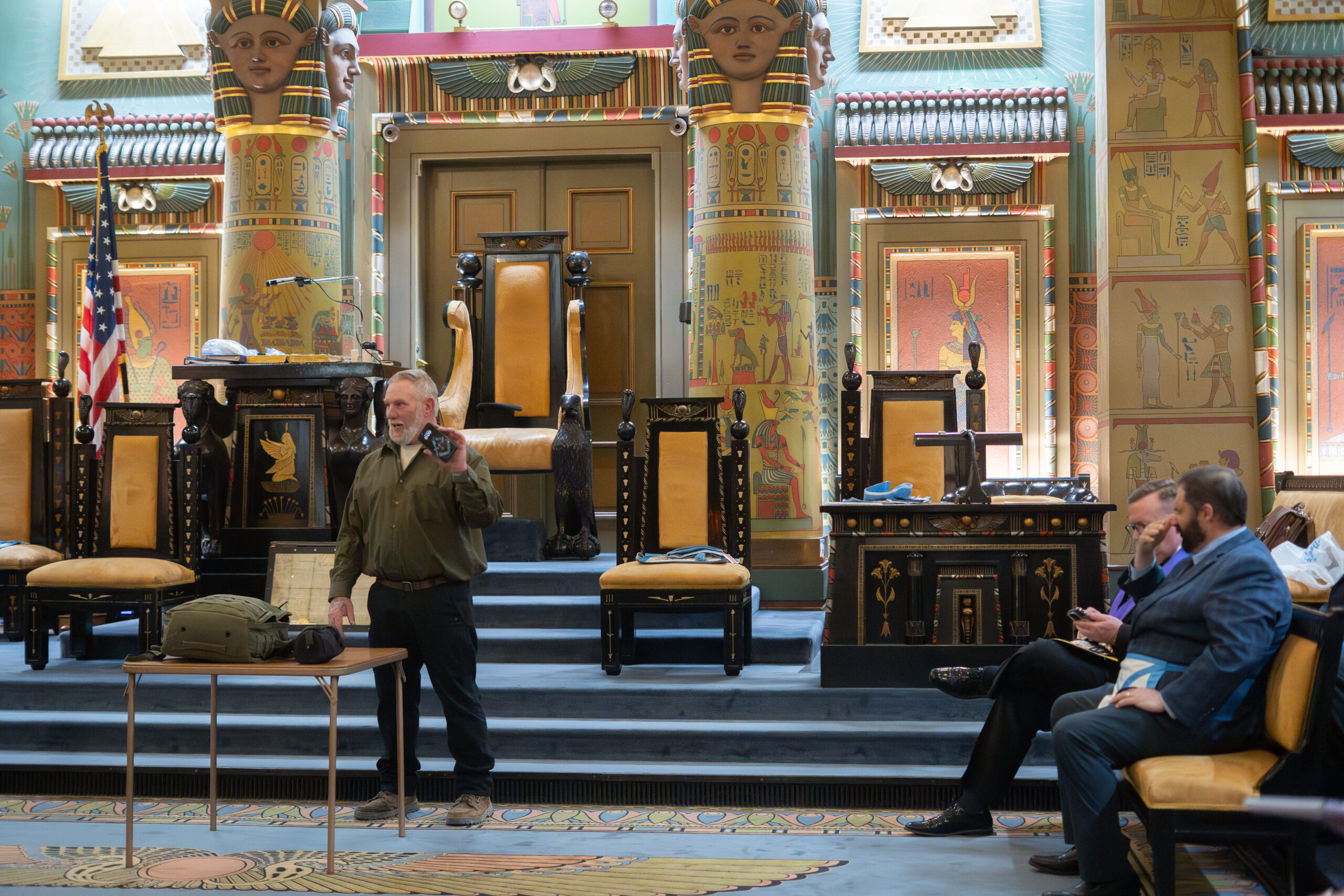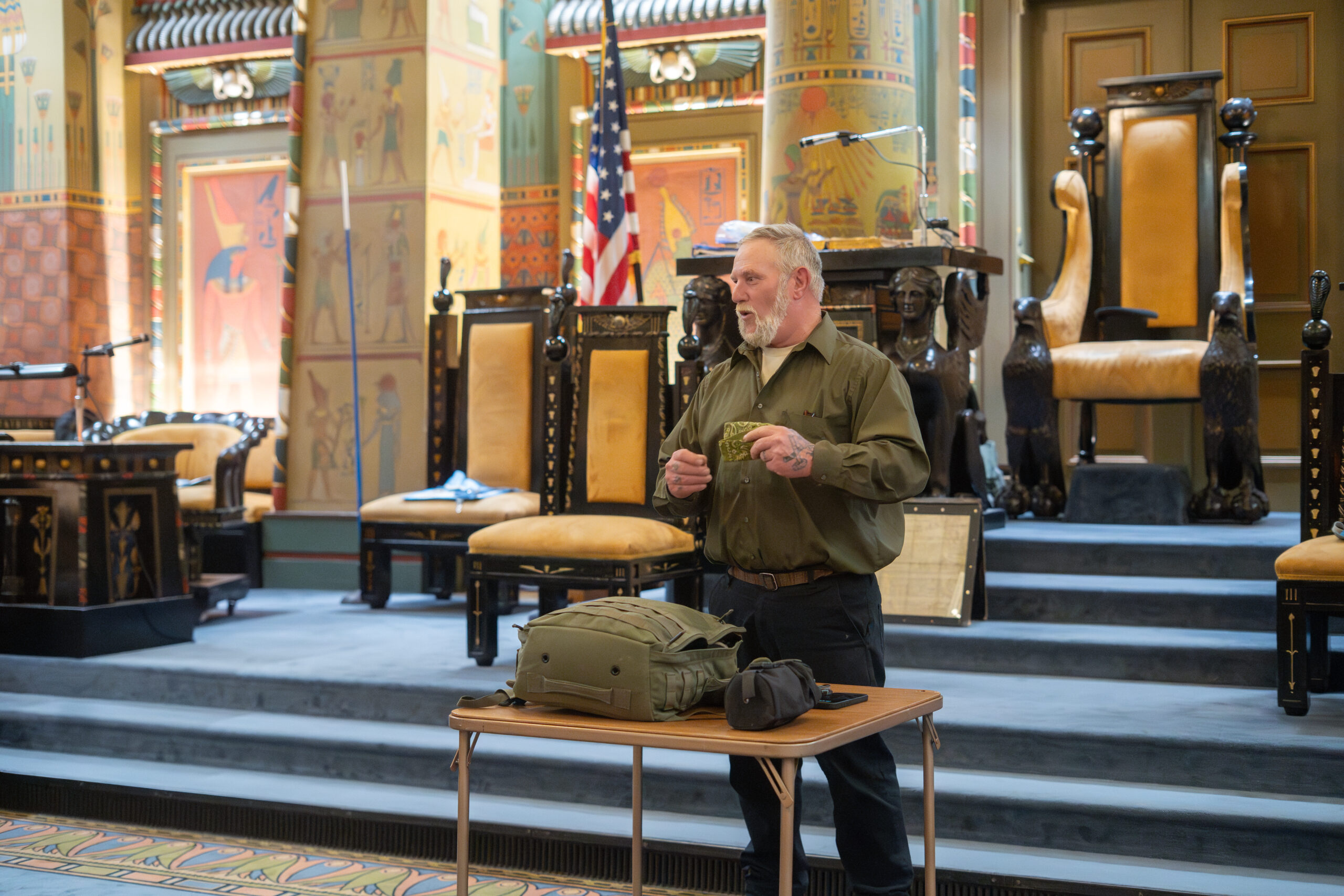Preparing for Survival Tips from Brother Dave Canterbury
In April, the Midwest and mid-South were pummeled by devastating storm systems unleashing life-threatening flash flooding, tornadoes and widespread damage. Parts of a 1,000-mile span from Texas to Ohio saw up to four months’ worth of rain in just five days, according to The Weather Channel.
An emergency like that can happen anywhere and at any time, even in Pennsylvania, said Brother Dave Canterbury, a member of Portland Lodge No. 366, Ohio, acclaimed author and wilderness survival expert. He gave a presentation about “critical thinking and survivor skills”
to members of Lodge No. 2 in May at the Masonic Temple in Philadelphia.
“Everyone should be prepared for anything, from a short power outage to a stuck elevator, to a storm that causes dangerous conditions, or something as simple as a car breakdown,” Dave said.
“Think about the I-95 situation two winters ago [when a severe snowstorm trapped hundreds of drivers on Interstate 95 in Virginia, causing some to be in a state of panic for more than 24 hours]. Being prepared really is as important every time you leave home as it is while you’re at home.”
During his talk, Dave explained real-life skills and tips that, if used properly, could help a person survive almost any natural disaster. Dave teaches survival skills as co-owner and supervising instructor of The Pathfinder School in Ohio, which USA Today named one of the Top 12 survival schools in the country. Dave has over 25 years of experience in bush crafting, outdoor self-reliance and primitive skills. He is eager to pass on his knowledge to anyone and everyone who wants to learn.
Dave is also co-owner of Self Reliance Outfitters, a store for survival gear and tools, and has published over 900 videos on the Pathfinder School, LLC YouTube channel. In 2015, he co-starred in a survival series, “Dirty Rotten Survival,” which aired on the National Geographic Channel. Dave also started the Survival Adventure Network on YouTube, a reality-based program involving real people engaged in true survival scenarios.
He is a New York Times bestselling author of “Bushcraft 101;” “Advanced Bushcraft;” “The Bushcraft Guide to Trapping, Gathering and Cooking in the Wild;” “The Bushcraft Essentials Field Guide;” and “Bushcraft Illustrated,” as well as co-author of “Bushcraft First Aid,” among others. “Bushcraft” is a term that refers to the skills and knowledge required to live and thrive in the wilderness.
As a hunting guide, Dave started thinking about what a person should carry with them and what they should do in case they became lost or stranded. Through his study, he developed a methodology for survival using the five items that have been used cross-culturally since ancient times to affect survival.
The 5 Cs of Survivability
- Cutting tool: Knives, saws, axes, machetes, etc., used for collecting firewood, preparing food, defense, crafting things and more
- Combustion device: Lighters, fire steels and primitive fire techniques used to start fires that will keep you warm, cook your food, illuminate your camp and keep predators away
- Cordage: Paracord, wires and vines used to construct shelters, capture food and hold things together
- Cover: Tarps, tents, cars and natural shelters used to protect you from outside elements. Always pack an extra set of clothing (preferably bright to be seen) and underwear.
- Carrying device: Baskets, bags and bottles used to help you carry things from one place to another, keep things cool, cook in or just keep everything in one place
“These items are a must for any survival or self-reliance scenario and should be the first things you pack in your backpack,” Dave said.
During his presentation, Dave gave a glimpse into all the items packed neatly in his less-than-15-pound GORUCK backpack. This specific backpack can carry a lot of weight comfortably and is bulletproof and indestructible. Dave carries his backpack with him daily in case of emergency, and he said the contents should be able to sustain someone for at least 24 to 48 hours.
“People carry a variety of different items depending on the situation, environment and planned activities,” Dave said. “This is called ‘adapting to the situation,’ which is what self-reliance and survival are all about. It has been my passion over the years to research what base items are really needed.”
For example, he said, you should carry items that function many different ways to address short-term emergencies, like a stainless steel water bottle impervious to fire; a clean bandana to wrap around a wound to stop it from bleeding and protect it from dirt; a mobile water filtration kit; a ham radio, which operates without the internet or a phone; or a military grade GPS device, which provides precise positioning and navigation capabilities in various environments. Some of these items can be purchased through specialized hardware or outdoor recreation stores or through Amazon.com, although you do need a license to operate a ham radio.
Everyday items like Band-Aids, twist ties and rubber bands can always come in handy and are easy to pack. Even a pants belt can double as a tourniquet to stop bleeding during an emergency.
“There are skills for emergencies that people don’t think about, like first aid, understanding navigation/maps and a GPS,” he said. “Most people don’t know how to read a map to communicate their location.
“You need to be able to find and process water; hydration is huge in any survival scenario. Being physically fit and
understanding self-defense is also important.”
Not only should you be prepared for outdoor emergencies, but ones in your home as well, like flooding, Dave said.
“Look beyond the short term when you’re prepping [for an emergency],” he said. “Food will run out. You need items to fix and repair things with. Store five-gallon buckets at your house. They have a million uses, from food and water storage to a toilet, washing machine and bathroom.”
A 10-foot aluminum Jon boat, for example, can help you row to a neighbor’s house if your house and car are submerged in water.
“Be prepared, but don’t over-complicate,” he said. “Have enough with you to sustain you for a few days. You constantly need critical thinking. That and problem solving are the No. 1 survival skills, and they go hand in hand.”
Dave spent a lot of time in the woods as a child, but only became interested in survival tactics after he started making outdoor videos in 2007/2008. He has survived many emergencies, including breaking down in a fishing boat deep in the mangroves of Florida for three days. “We just had to wait it out until they looked for us, and drank water from the fish ice on the boat,” he said.
As Masons are taught about the Seven Liberal Arts in Freemasonry, the two that stand out from Dave’s talk are “Astronomy,” a basic core use for navigation, and “Logic,” critical thinking to survive outdoors, said Peter Lavelle, W.M., P.M., Lodge No. 2, an outdoorsman himself, who invited Dave to speak.
“Combining all the ideas as explained really just made sense to me, and one of the greatest acts of Charity, besides laying down your life for another, is to share useful knowledge that can be passed on,” Peter said.
Dave, who alongside his wife, Iris, was presented with an honorary membership to Lodge No. 2, agrees with that sentiment.
“We as Masons are lucky,” he said. “We have an obligation to aid and assist our brothers. On top of that, Masonry is so diverse, there’s a lot of background we can pull from each other to be more prepared as a community. We have a brotherly group we can always turn to if we need help.”
Pathfinder School: The Pathfinder School, LLC
Self-Reliance Outfitters: Survival Gear | Self Reliance Outfitters™






